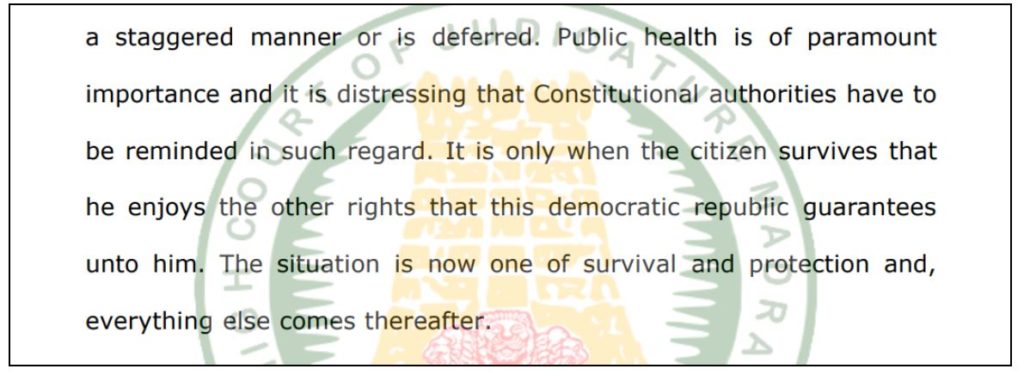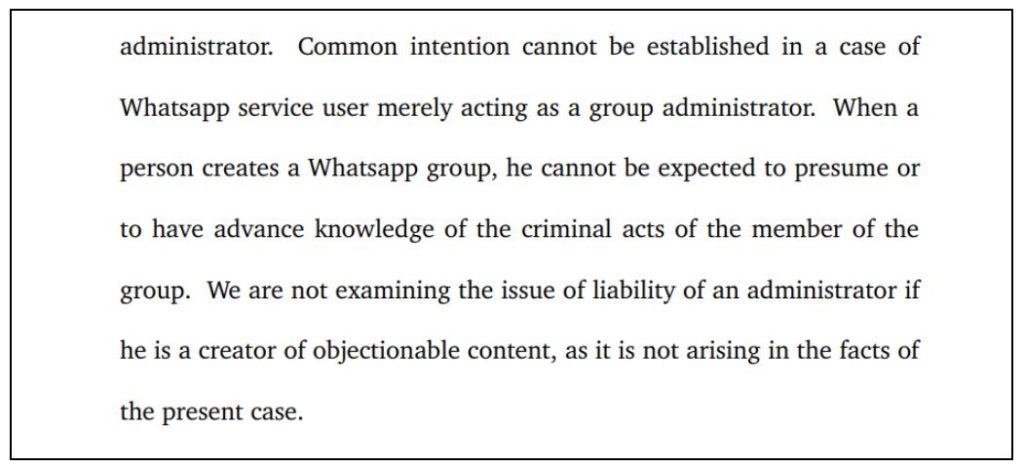In this roundup of important court judgments, we look at constitutional court remarks & directions on disregard of COVID safety protocols during election campaigns and rallies, the liability of WhatsApp group admins, obstruction of medical oxygen supply, and inefficient management of COVID-19 pandemic by state governments.
Madras HC: Election Commission singularly responsible for COVID-19 second wave
In taking suo-moto cognizance of the second wave of COVID-19 pandemic, the high court came down heavily on the Election Commission of India (ECI) for allowing political rallies during the COVID-19 pandemic.
The court was hearing a petition pertaining to maintaining COVID-19 protocols at a solitary assembly constituency. The petitioner contended that at the assembly constituency in Karur, special measures must be taken at the time of counting because even though an additional hall has been arranged by the Election Commission for the purpose of counting, that may not suffice to accommodate the counting personnel and the agents of 77 candidates. The high court used this opportunity to take a stand at the larger picture of election campaigns and rallies.
The court observed that the ECI could not ensure that political parties adhered to the COVID-19 protocol at the time of election campaigns and rallies. The judgement notes that despite repeated orders on almost every election petition to maintain COVID-19 protocol during the campaign time, the ECI maintained silence as campaigning and rallies were conducted without distancing norms and in utter disregard of the other requirements of the protocol.

In view of the rapid surge in the number of COVID-19 cases on a daily basis, the bench of Chief Justice Sanjib Banerjee told the ECI’s counsel “Your institution is singularly responsible for the second wave of COVID-19”. The Chief Justice orally remarked that officers of ECI should be booked on murder charges for allowing such blatant violation of COVID-19 protocols during election campaigns and rallies.
With respect to the present petition, the judgement notes that the ECI has assured that six additional counting tables have been organized so that distancing norms can be maintained. The court directed that similar appropriate measures have to be adopted at every counting centre and it is only upon maintaining regular sanitization, proper hygienic conditions, the mandatory wearing of a mask, and adherence to the distance norms, should any counting begin or be continued. The court further states that the State Health Secretary and the Director of Public Health should be consulted by the ECI and the Chief Electoral Officer responsible in the State, to put appropriate measures in place immediately.
Bombay HC: WhatsApp Group Admins not liable for member’s objectionable post if there is no common intention
In the case Kishor Tarone v. State of Maharashtra & Anr., the high court held that group admins of WhatsApp groups are not liable for group member’s objectionable posts unless it is shown that there was a common intention or pre-arranged plan.
The crux of the issue involved is whether an administrator of a WhatsApp group can be held criminally liable for the objectionable post of its member for committing punishable offences. The case was of a WhatsApp group administrator who was accused under sections 354-A(1)(iv) (making sexually coloured remarks), 509 (Word, gesture or act intended to insult the modesty of a woman), 107 (Abetment of a thing) of the IPC and section 67 of the IT Act, for inaction against a group member who made objectionable remarks against a female member.
The woman contended that despite the member using foul language against her, the administrator did not remove him from the WhatsApp group. Further, the admin did not ask the accused to submit an apology to her, and on the contrary, he expressed his helplessness.
The court notes that in order to adjudicate the said issue, it is necessary to understand the functioning of the WhatsApp messaging service. Once a group is created, the functioning of the administrator and that of the members is at par with each other, except for the power of adding or deleting members to the group. The Administrator of a WhatsApp group does not have the power to regulate, moderate or censor the content before it is posted on the group. In the absence of a specific penal provision creating liability, an administrator of a WhatsApp group cannot be held liable for objectionable content posted by a member of a group.

Therefore, the judgement states that a group administrator cannot be held vicariously liable for an act of a member of the group, who posts objectionable content unless it is shown that there was a common intention or pre-arranged plan. In conclusion, the court quashed the FIR and subsequent charge sheet against the WhatsApp group administrator.
Delhi HC: Ensure no obstruction in transport of oxygen to Delhi.
In the case Balaji Medical & Research Centre Vs. Union of India & Ors., the high court held that the state government should initiate logistical work for efficient internal distribution of medical oxygen.
The court was hearing an urgent plea by Balaji Medical and Research Centre seeking urgent directions as regards the supply of oxygen in Max Hospitals, operating at various branches including Saket, Vaishali, Shalimar Bagh, Patparganj, and Gurgaon.
The Solicitor General of India submitted that a ban has been instructed on industrial use of oxygen and time was given till 22 April 2021 as technological industries require about 72 hours to shut down their operations. The Senior Advocate, appearing for the Delhi Government, also submitted that there were obstructions caused at the Delhi-Haryana border for the movement of oxygen tankers to Delhi.
Questioning the said submission, the bench of Justice Vipin Sanghi and Justice Rekha Palli remarked that it is difficult to accept that even in such urgent situations, industries are being allowed to function and cannot be stopped even for some time, till some alternate arrangements are made. The bench noted that in previous orders, the bench had directed the Centre to divert oxygen from steel and petroleum industries to Delhi.
The bench observed that the Delhi Government should initiate the logistical work for the internal distribution of oxygen allotment. The bench remarked since it is a national emergency, industries with oxygen can be instructed to divert. During the course of the hearing, the bench was informed that oxygen supplies have been received by Max Hospital, Patparganj, and Max Hospital, Shalimar Bagh.
In hearing another similar writ petition filed by Saroj Super Specialty Hospital seeking urgent critical supply of oxygen, the bench of Justice Vipin Sanghi and Justice Rekha Palli remarked that if the supply of Medical Oxygen to Delhi is blocked, then the local authorities such as DMs, SSPs will be held responsible for its movement shall be held criminally liable. During the hearing, another hospital appeared before the Bench saying that they have only 3 hours of Oxygen left. The order emphasised that there should be free movement of oxygen-carrying vehicles into the cities and also directed the authorities concerned, bound by the order passed under the Disaster Management Act, to ensure strict compliance.
Jharkhand HC: Pathetic Situation in State; non-availability of Remdesivir Injection and medicines.
Taking suo-moto cognizance, the high court expressed serious concern over the manner in which the State of Jharkhand has been handling the recent surge in COVID-19 cases and issued directions on COVID management.
The court took note of the non-availability of CT-Scan machines, which an important requirement for detecting the extent of COVID-19 infection in the lungs. It was also brought to court’s attention that private hospitals are charging exorbitant rates for CT scans and other tests. In the light of these concerns, the court was informed by the Principal Secretary Department of Health that CT-Scan machines would be purchased soon.
The court took cognizance of the issue of the non-working condition of Electric Crematoriums in the state. Due to the large-scale death caused by the second wave of COVID-19, the court directed the concerned municipal authorities to remedy the situation at the earliest.
The court also took note of the acute shortage of medicines for treating COVID-19 patients such as Remdesivir Injection, Favipiravir, Doxycycline tablet, and even the tablets of Fluguard, Vitamin-C, and Zinc, which are not available in the open market. It was brought to court’s attention that Remdesivir Injection and Favipiravir Tablets are being black marketed at a high cost. It was further highlighted that there is a lack of adequate supply of medical oxygen in several hospitals. To this, the Court raised the following two issues:
- Why are essential medicines only being supplied to certain top medicine shops instead of maintaining adequate supply to all medical shops so that people may get adequate medicine for their treatment from every corner of the State, even residing in isolation?
- On what basis the medicines are being supplied to certain top medicine shops and what are the names of those shops? Whether the list of essential medicines has been circulated to the public so that they could also purchase the same?
Noting that the State of Jharkhand had not taken any sincere effort to procure the adequate supply of essential medicines, the Court passed following directions:
- The State authorities to bring on record, with an affidavit, as to what steps have been taken up to 17 April 2021, to secure an adequate supply of Remdesivir injections and Favipiravir tablets.
- The Drug Controller to bring on record up-to-date details of supply of Remdesivir injections and Favipiravir tablets to the medicine shops/hospitals, supported by relevant documents. What are the parameters to decide as to which medicine shop will be provided with said medicines?
- Whether the general public was informed of the names of the medicine shop where the supply of Remdesivir Injection and Favipiravir Tablet has been notified. If not, then why?
- The Principal Secretary, Department of Health, Medical Education and Family Welfare, Govt. of Jharkhand as also the Drug Controller of the State of Jharkhand to ensure adequate supply of Remdesivir Injection and Favipiravir Tablet, and also other medicines like Doxycycline, Flugaurd, Vitamin-C and Zinc tablets; as well as an adequate supply of medical oxygen forthwith.
- What steps have been taken to check the black marketing of these medicines at the time of scarcity?
- The Deputy Commissioner, Ranchi, and of other districts, are directed to monitor the rate of CT-Scan and other pathological tests in Private Hospitals in order to prevent exorbitant rates, by publishing the rates in the daily newspaper.
- The authorities are further directed to make arrangements for entertaining any complaints in this regard.
- The Principal Secretary, Department of Health, Medical Education and Family Welfare, Govt. of Jharkhand are further directed to monitor the steps taken by Deputy Commissioner(s) in this regard.
Featured Image: Important Court Judgements


